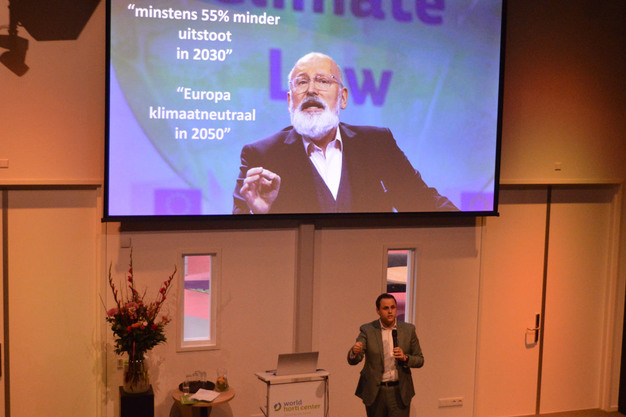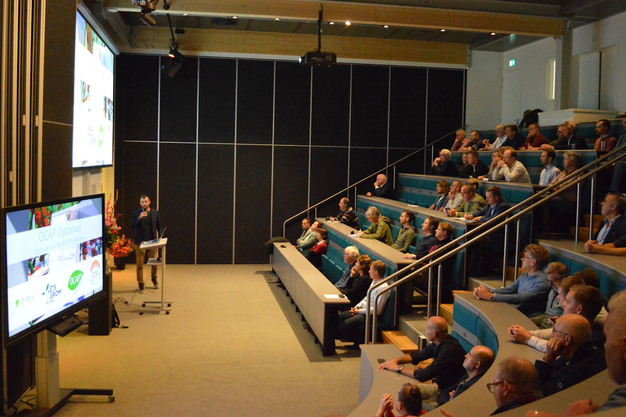Recently, some 75 people were given a lesson in lobbying on the impact of efficient cultivation. Jesse Schevel of Horticulture Netherlands had been invited for this. Other speakers included Sander Hogewoning on plant physiological concerns in energy-efficient growing and, jumping in at the last minute, Jeroen Boonekamp of B-Mex. He talked about the CO2 optimization tool OCAP Optimaal.
Jeroen replaced Arne Bac of Rabobank at the event organized by Horticulture Netherlands, Vertify, World Horti Center, AVAG, Rabobank, and Plantum in a busy time for events. Robert Solleveld of Horticulture Netherlands, therefore, opened with a quip: "We thought, let's organize another event for a change."
A room full of suppliers, growers, and other interested parties was first briefly lectured by lobbyist Jesse on the much-discussed tax plans. These seemed to turn out to be disastrous for horticulture, but thanks to the covenant, the lobbyist stressed, the plans have nevertheless been adjusted in such a way that growers are given longer to make themselves future-proof through sustainability. A gain for the sector is that the reduced horticultural natural gas tariff will remain in place for longer.

Jesse Schevel with Frans Timmermans on the screen.
EU climate ambitions tightened
But not indefinitely. That much should be clear by now. Anyone who thinks the cabinet is coming up with all the climate plans on its own has been taken out of their dream by Jesse. Many of the measures taken by the Dutch government are inspired by European plans. It all revolves around the Green Deal, which Frans Timmermans may have been the face of for a long time, a role now filled by Wopke Hoekstra.
The latter has "even more ambitious plans." Hoekstra wants CO2 emissions in the European Union to be reduced by 90-95% by 2040. Timmermans was aiming for a 55% reduction. These new ambitions from Hoekstra are achievable for horticulture, the lobbyist argues. He again points to the covenant. "However, it does give us an extra-strong stick," he says.
Fit for 55
The Green Deal consists of three components: the Farm-to-Board strategy (containing the ambition of 25% organic cultivation), the biodiversity strategy (including 50% less chemical crop protection by 2030), and Fit for 55. Jesse went into more detail on the latter because it will affect horticulture in particular.
The government's recently steered tax plans through the House of Representatives cannot be seen separately from the Green Deal and Fit for 55. Europe requires member states, among other things, to levy higher energy taxes and make CO2 emissions more expensive by including fossil fuels in the EU Emissions Trading Scheme (ETS). Only a few very large Dutch growers, as do large industrial giants, fall under this.
Unfair competition
At Glastuinbouw Nederland, they are concerned about the EU plans because there is a danger that Dutch or European tomato cultivation will be disadvantaged compared to, for example, tomato cultivation in Morocco. Morocco is not an EU member state and has nothing to do with higher costs for CO2 emissions, for example.
Poland is an EU member state, but Dutch horticulture still sees some issues here too. In the audience, after the lobbyist's story, the strong coal dependence of Polish growers was pointed out. Shouldn't they meet EU targets? Yes, Jesse indicated. Emissions from all member states have to come down. However, because the reference year in Europe is 1990, they need to take 'relatively fewer big steps' in Poland, for example.
Rewarding frontrunners
Glastuinbouw Nederland argues in Europe for 'fairly rewarding' frontrunners. Supermarkets should pay more for the products of frontrunners. However, as it concerns food, this is sensitive in the EU. Another 'solution' to the competition problem, where non-EU countries are concerned, is a carbon tax on imports (CBAM). The European Parliament agreed to this this spring. Agriculture and horticulture, however, are not included in CBAM. Again, raising food prices is sensitive. Jesse expects that lobbying on this issue will be needed "for years to come."

Sander Hogewoning hosted a quiz.
Why does a crop need to evaporate?
After the lesson on lobbying, Sander Hogewoning of Plant Lighting went into how plants experience more energy-efficient growing. One way he did this was by means of a quiz with the question: Why does a crop need to evaporate? There is still remarkably little knowledge available in the literature about evaporation. A reason for researchers to do more research into this, especially after the switch from HPS to LED lighting. Researchers can also do air velocity measurements in this respect. The audience asked whether this is also accessible to 'ordinary' growers. Those who want to get an idea without investing in expensive sensors could conduct a predatory test.
Optimise minimum CO2 deployment
The last speaker was Jeroen Boonekamp of B-Mex. He talked about how the tool OCAP Optimaal was further developed within a Kas als Energiebron (Greenhouse as a Source of Energy) project. In this way, growers can also see how much the CO2 not produced by OCAP costs them and what extra production it will generate. The question in each case is: is the extra CO2 you put into cultivation worth it?
Until now, the tool has mainly served to maximize the CO2 input. In the Kas als Energiebron project, the focus has shifted to minimizing the use of CO2 without harming the crop. The modified tool was tested with growers this summer. A next step is to feed the data from the tool directly into the climate computer. This is not yet possible. The grower uses OCAP Optimaal's platform.

Jeroen Boonekamp of B-Mex was the last speaker.










